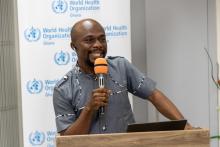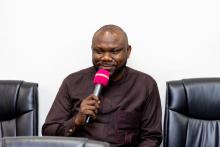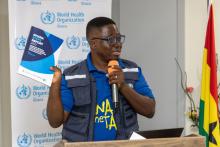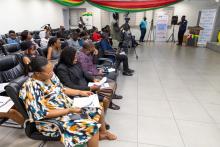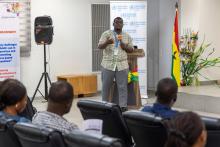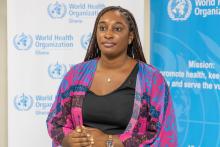WHO Equips Journalists to Spotlight Critical Health Insights from 2023 Ghana's STEPS Report
In public health, data serves as a critical foundation for understanding challenges and making informed decisions. Without clear, accurate information, it’s difficult for individuals and communities to take meaningful action, and policymakers to devise and implement effective solutions. Recognizing this need, the World Health Organization (WHO), in collaboration with Ghana’s Ministry of Health, organized a media training ahead of the Ghana STEPS Survey 2023 report launch to ensure its findings are communicated to Ghanaians in accessible and impactful ways.
This pre-launch training aimed to equip journalists with essential tools to interpret the data, craft impactful stories, and raise awareness on critical health challenges, such as the rising burden of Non-Communicable Diseases (NCDs), which account for 45% of deaths in Ghana. With the media’s ability to reach communities nationwide, their stories can inspire the public to adopt healthier lifestyles and encourage stakeholders to strengthen healthcare solutions.
During the training, journalists from diverse media outlets engaged in practical sessions on survey methodology, data interpretation, effective storytelling, and audience engagement. These skills will enable the media to transform complex data into stories that resonate with the public, helping to raise awareness and drive action on critical health issues.
Speaking on the essence of this training, Dr Joana Ansong, Team Lead for the Universal Health Coverage, Communicable and Noncommunicable Diseases (UCN) Cluster said, “With the media’s reach and influence, accurate and insightful reporting on the findings of the STEPS survey can play a significant role in improving Ghana’s health outcomes. Together, we can raise awareness and drive conversations around non-communicable diseases”.
Journalists found the training valuable for enhancing their understanding and effectively reporting on complex health data. Nana Kofi Owusu, a health reporter from United Television, shared, “This training gave us hands-on skills to break down complex data for our audiences, which will help us bring to light these pressing health issues”.
Another journalist, Benedicta Sarfoa Asamoah from Media General, added, “The insights we gained today will allow us to craft stories that resonate with Ghanaians and motivate action on NCD prevention and care”.
The training reflects WHO and Ghana’s Ministry of Health's ongoing commitment to empowering journalists to drive meaningful conversations that impact public health positively, working collaboratively to shape a healthier Ghana for all.
For Additional Information or to Request Interviews, Please contact:
Abdul-Lahie Abdul-Rahim Naa
Communications Officer
WHO Ghana Country Office
Email: abdullahiea [at] who.int (abdullahiea[at]who[dot]int)
Tel: +233 20 196 2393




